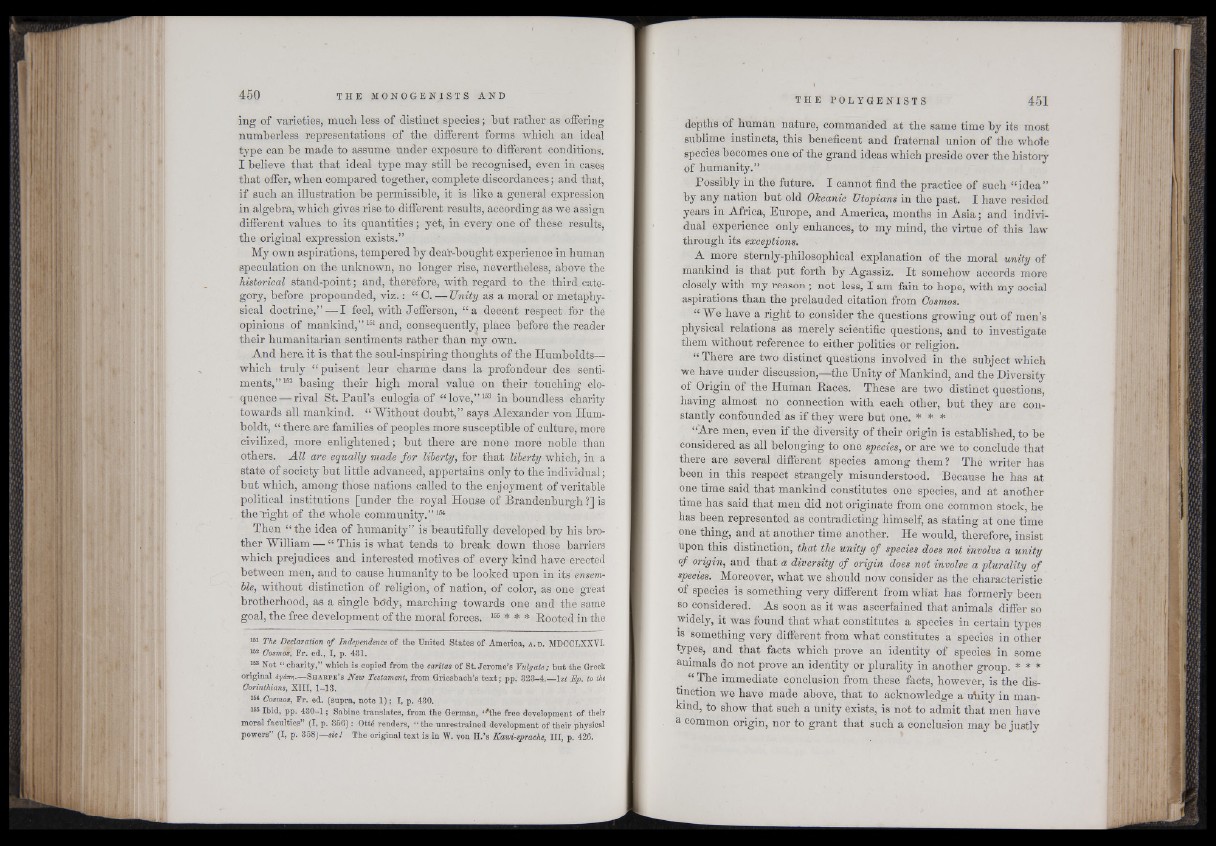
ing of varieties, much less of distinct species; but rather as offering
numberless representations of the different forms which an ideal
type can he made to assume under exposure to different conditions.
I believe that that ideal type may still he recognised, even in cases
that offer, when compared together, complete discordances; and that,
if such an illustration be permissible, it is like a general expression
in algebra, which gives rise to different results, according as we assign
different values to its quantities; yet, in every one of these results,
the original expression exists.”
My own aspirations, tempered by dear-bought experience in human
speculation on the unknown, no longer rise, nevertheless, above the
historical stand-point; and, therefore, with regard to the third category,
before propounded, viz.: “ 0. —Unity as a moral or metaphysical
doctrine,” — I feel, with Jefferson, “ a decent respect for the
opinions of mankind,” 151 and, consequently, place before the reader
their humanitarian sentiments rather than my own.
And here it is that the soul-inspiring thoughts of the Humboldts—
which truly “ puisent leur charm e dans la profondeur des sentiments,”
153 basing their high moral value on their touching eloquence—
rival St. Paul’s eulogia of “ love,” 153 in boundless charity
towards all mankind. “ Without doubt,” says Alexander von Humboldt,
“ there are families of peoples more susceptible of culture, more
civilized, more enlightened; hut there are none more noble than
others. All are equally made for liberty, for that liberty which, in a
state of society but little advanced, appertains only to the individual;
but which, among those nations called to the enjoyment of veritable
political institutions [under the royal House of Brandenburgh ?] is
the "right of the whole community.” 154
Then “ the idea of humanity” is beautifully developed by his brother
William — “ This is what tends to break down those barriers
which prejudices and interested motives of every kind have erected
between men, and to cause humanity to he looked upon in its ensemble,
without distinction of religion, of nation, of color, as one great
brotherhood, as a single body, marching towards one and the same
goal, the free development of the moral forces. 155 * * * Rooted in the
151 The Declaration of Independence of the United States of America, a . d . MDCCLXXVI.
182 Cosmos, Fr. ed., I, p. 431.
153 Not “ charity,” which is copied from the caritas of St. Jerome’s Vulgate.; hut the Greek
original dydn-^.—S h a r p e ’s New Testament, from Griesbach’s text; pp. 323-4.—1st Ep. to the
Corinthians, XIII, 1—13.
184 Cosmos, Fr. ed. (supra, note 1); I, p. 430.
165 Ibid, pp. 430-1; Sabine translates, from the German, “*the free development of their
moral faculties” (I, p. 356): Ott5 renders, “ the unrestrained development of their physical
powers” (I, p. 358)—sic! The original text is in W. von H.’s Kawi-sprache, HI, p. 426.
depths of human nature, commanded at the same time by its most
sublime instincts, this beneficent and fraternal union of the whole
species becomes one of the grand ideas which preside over the histoiy
of humanity.”
Possibly in the future. I cannot find the practice of such “ idea”
by any nation hut old Oceanic Utopians in the past. I have resided
years in Africa, Europe, and America, months in Asia; and individual
experience only enhances, to my mind, the virtue of this law
through its exceptions.
A more sternly-philosophical explanation of the moral unity of
mankind is that put forth by Agassiz. It somehow accords more
closely with my reason; not less, I am fain to hope, with my social
aspirations than the prelauded citation from Cosmos.
“We have a right to consider the questions growing out of men’s
physical relations as merely scientific questions, and to investigate
them without reference to either politics or religion.
“ There are two distinct questions involved in the subject which
we have uuder discussion,—the Unity of Mankind, and the Diversity
of Origin of the Human Races. These are two distinct questions,
having almost no connection with each other, hut they are constantly
confounded as if they were hut one. * * *
“Are men, even if the diversity of their origin is established, to he
considered as all belonging to one species, or are we to conclude that
there are several different species among them? The writer has
been in this respect strangely misunderstood. Because he has at
one time said that mankind constitutes one species, and at another
time has said that men did not originate from one common stock, he
has been represented as contradicting himself, as stating at one time
one thing, and at another time another. He would, therefore, insist
upon this distinction, that the unity of species does not involve a unity
of origin, and that a diversity of origin does not involve a plurality of
species. Moreover, what we should now consider as the characteristic
of species is something very different from what has formerly been
so considered. As soon as it was ascertained that animals differ so
widely, it was found that what constitutes a species in certain types
is something vexy different from what constitutes a species in other
types, and that facts which prove an identity of species in some
animals do not prove an identity or plurality in another group. * * *
“ The immediate conclusion from these facts, however, is the distinction
we have made above, that to acknowledge a uViity in mankind,
to show that such a unity exists, is not to admit that men have
a common origin, nor to grant that such a conclusion may he justly